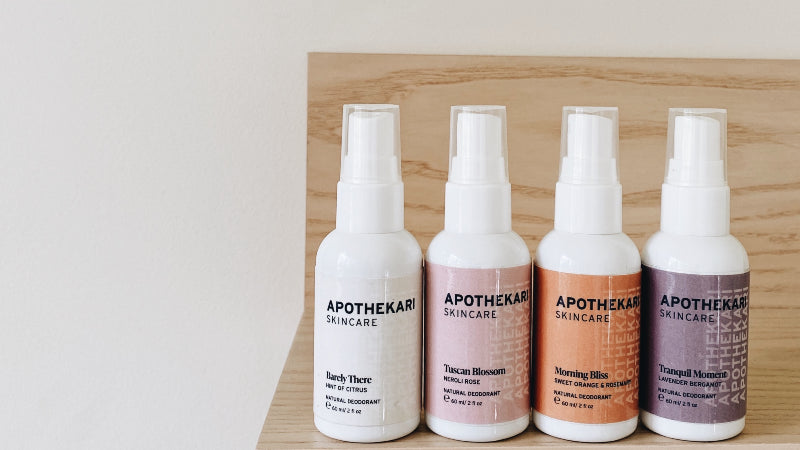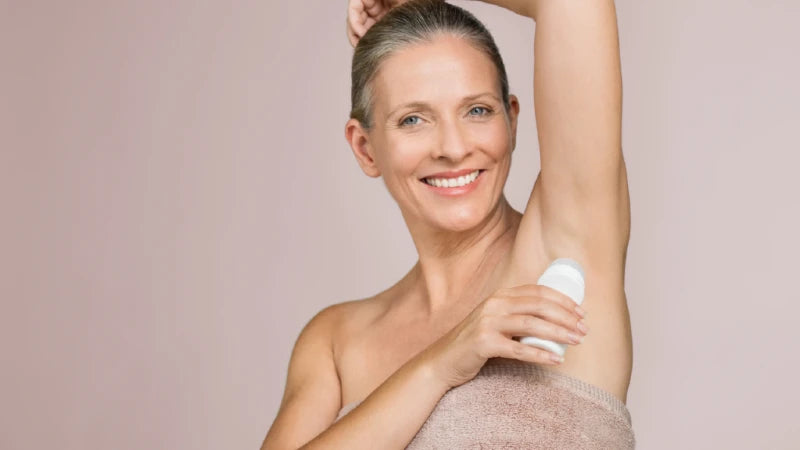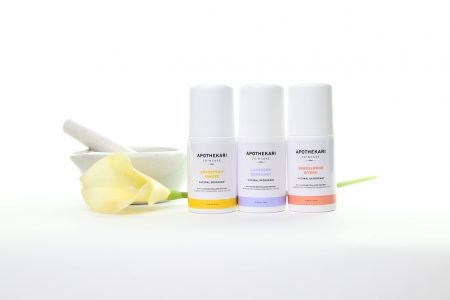Blog
Everything You Wanted to Know About Natural Deodorant. And How to Choose the Right One
Curious about making the switch to natural deodorant? Or wondering if using one is right for you? You’ve come to the right place. In this post, we’re answering alllll the questions you may have about natural deodorant and finding one that’s right for you. Landing upon a deodorant that actually works–trust us, we’ve been through the process of trial and error–can seem as hard as finding the proverbial needle in the haystack. Ones that manage to control odor, effectively, are few and far between. Not to toot our own horn, but Apothekari’s natural deodorants do. Q: Does Natural Deodorant Work? If you’ve already been on a hunt to find the perfect deodorant, then we feel your pain. Hard as rock crystals that tug at your skin, sticky globs that drip down your arms and oil based ointments that stain your shirts. Not only are they messy, inconvenient and mean to your clothes, many of them just don’t work. We were about to give up too, until we decided that if the perfect deodorant didn’t exist, that we’d create our own. One that really works! Apothekari’s new spray deodorants rely on a triple combination of odor destroying ingredients that stop the stench: Natural odor eating enzymes that break down the stinky stuff in sweat so that you won’t smell Probiotics to help increase the concentration of good bacteria on your skin, which attacks the bad bacteria that leads to odor Glycolic acid, which keeps skin at a friendly pH and inhibits the production of the smell inducing bad bacteria. Plus we’ve included soothing allantoin and caffeine to ensure that your pits not only smell fresh, but feel soft and smooth too. Is It Safe to Use Natural Deodorant? Natural deodorants differ from antiperspirants because they are free from aluminum, the ingredient that stops sweat–and the ensuing odor–from developing. Instead, they rely on ingredients that can do one of several things: Absorb wetness (arrowroot powder, cornstarch) Increase or decrease skin pH to make it inhospitable to odor causing bacteria (baking soda, glycolic acid) Antibacterial properties (tea tree and other essential oils) Act as probiotics (ethylhexylglycerin). Most of the ingredients are safe (except for baking soda, whose high pH can lead to skin irritation and rashes and which we’d never recommend in deodorant) and well tolerated by most individuals who use them. When/How Often Should I Apply the Deodorant? Apply deodorant after showering or bathing, to your pits, feet or anywhere else on your body that needs some freshening up. Since we’re all different, use how much you sweat as a gauge. You may want to reapply before physical exercise or when heading out for the evening. It’s safe to use our deodorants more than once in a day. Do You Sweat More With Natural Deodorant? Yes, you will sweat more with natural deodorant compared to an antiperspirant. Antiperspirants minimize sweating, while deodorants works to control odor and have no impact on the amount of sweat. Is It a Gimmick? Well formulated deodorants actually deliver on their promise of controlling odor. Keep in mind that a deodorant isn’t an antiperspirant, so they won’t stop the sweat, but if they are made with the right ingredients, then they will help to keep you smelling fresh. Q: Antiperspirant vs Natural Deodorant Antiperspirants work by blocking sweat glands, reducing the amount of sweat that reaches the skin’s surface. The bacteria that live on your skin don’t have any sweat to break down so the odor causing by-products are not produced. Natural deodorant doesn’t reduce sweat, but prevents odor with ingredients that reduce the odor causing bacteria and/or by masking it with scent. While many natural deodorants rely on baking soda to help reduce bacteria by increasing the skin’s pH to 8-9; we use glycolic acid, instead, which helps skin to stay within it’s ideal pH, and minimizes the risk for irritation. What is the Most Effective All Natural Deodorant? The most effective deodorant is one that’s right for you. Although there are some ingredients known to help control odor (we listed a few above), not every deodorant works for every person. It’s a matter of body chemistry, individuality and the formulation itself. You may need to try a few deodorants before you find one that’s right for you. But we can tell you that the majority of people who use our deodorants, have nothing but positive things to say about it! But you don’t have to trust us; check out the testimonials on our pages. Q: What is the Healthiest Natural Deodorant? There isn’t just one deodorant that can claim to be the healthiest, but there are certain things to look for when choosing a healthy deodorant. pH Balance. pH is a scale that ranges from 0 to 14 and measures the acidity or alkalinity of a substance. High pH (14) means alkaline and low pH (0) is acidic. pH 7 is considered neutral. Your skin is naturally acidic, sitting somewhere between 4.5-6.5 and covered by a fine layer called the ‘acid mantle’. This layer helps to keep skin healthy, locking moisture in, and offering protection against harmful substances, including bacteria. It’s important to maintain this level to enable the ‘acid mantle’, the fine layer that sits on top of our skin, to function properly, retaining moisture and keeping germs out as well. If the pH is disturbed often or for a long period of time, your skin can become very unhappy. It’s why we avoid baking soda (or magnesium hydroxide) in our formulations. These high pH substances–greater than pH 8 or 9, may work initially, but over time, can lead to itching and irritation including rashes and even chemical burns. Apothekari’s natural deodorants are free from baking soda; the slightly acidic pH means happy skin. Aluminum Free. Aluminum is the key ingredient in antiperspirants and works by plugging sweat glands to prevent sweat, and the ensuing odor. And while you may be concerned about the link between aluminum and Alzheimer’s Disease or breast cancer, studies have disputed that they’re connected when it comes to your health. But it’s not without its downsides. Aluminum is the ingredient that stains clothes yellow. And, it can irritate skin in sensitive individuals so, for these reasons, you may want to avoid it. CAVEAT: Many deodorants claim to be aluminum free yet may contain kaolin clay (chemical formula Al2Si2O5(OH)4, or aluminum and silica). If you’re trying to avoid aluminum, don’t make the mistake of choosing one with kaolin clay. Our deodorants don’t contain any aluminum-containing ingredients. Baking Soda Free. Although it works to control odor, baking soda is a high pH ingredient (see point 1 above) that kills the good bacteria on your skin that keeps it healthy. This disrupts your skin’s natural ecosystem, and over time, can lead to red, itchy and irritated skin. Probiotics. Probiotics work to increase the amount of ‘good bacteria’ that live on your skin. These good bacteria destroy the ‘bad bacteria’ that lead to odor so you’ll definitely want to use a formulation that contains probiotics. Is Baking Soda Harmful in Deodorant? We’ve discussed our concern with baking soda in deodorant above. It may be considered a natural ingredient, but stripping your skin’s natural pH leads to skin irritation. If you’ve tried natural deodorants before and experienced itchy, red or irritated skin, then baking soda is most likely to blame. Our natural deodorants are B.S. free in more than one way! There’s no baking soda in our formulations. Instead, we rely on a combination of odor neutralizing enzymes, probtiotics and glycolic acid to help keep your underarms–and other body parts–smelling fresh and feeling clean all day. Q: What Causes Body Odor? Sweat itself is odorless but when it’s released from either your eccrine glands (over most of your body) or apocrine glands (hairy areas) it mixes with the bacteria that live on your skin. These bacteria break down certain proteins in your sweat into acids, which lead to body odor. Apocrine sweat, which comes from hairy areas, is higher in protein. And when it’s broken down, it leads to smellier acids. It’s why body odor tends to occur more frequently in your pits and groin. Why Do I Smell Like BO With Natural Deodorant? See the point above. It means that your deodorant just isn’t cutting it. We’ve found that ingredients like coconut oil or a blend of essential oils, which start off smelling pretty, are the worst offenders. Does Natural Deodorant Make Your Armpits Stink? If the formulation you’re using is not effective, then yes you will smell! It won’t be able to effectively fight against odor, leaving you smelling like you’re trying to cover something up. Or worse yet, like a pair of damp, smelly gym socks. Get thee to a new formulation. Have you tried ours? Q: What Deodorants Have No Parabens? Ours have no parabens! Parabens are a class of preservatives that are used in both food and cosmetics to help keep them safe from developing bacteria, mold or fungi, which can be harmful to your health. However, many people are concerned with their safety profile and link to hormone disruption, which harm fertility and reproductive organs, affects birth outcomes, and increases the risk of cancer. While there is little evidence to suggest that parabens actually do any of this, many people wish to avoid parabens in their personal care products. For this reason, Apothekari’s natural deodorants are made without parabens. However, you can be assured that they are preserved properly, to ensure your safety. Q: Can You Just Switch to Natural Deodorant? Yes you can! While antiperspirant plugs the sweat glands to prevent sweat from developing, it is perfectly safe to stop using antiperspirant one day and then start using a natural deodorant the next. Your pits and other body parts will be very happy if you choose the right formulation. However, if you opt for one that contains high pH baking soda or magnesium hydroxide, then you may experience a reaction, including itching or a rash. Despite what you’ve been told, your body is NOT releasing toxins, it is simply reacting to an ingredient (baking soda) that is not good for your skin. If this happens, stop using the product and wait for the reaction to clear up. In some cases, it may not and if it lingers for longer than a 2-3 days, please check in with your doctor. What Happens When You Start Using Natural Deodorant? If you’re changing over from antiperspirant to natural deodorant, the main difference you’ll notice is an increase in sweating. Antiperspirants form plugs to block sweat glands and the odor that follows. Once you stop using an antiperspirant, it can take about a week for these plugs to disappear. The result will be an increase in sweating, but as long as you’re using an effective deodorant formulation, you shouldn’t notice a smell. Natural Deodorant for Men Men and women sweat a bit differently. Men tend to sweat more than women, and their sweat also smells a bit different. However, there’s no reason that they can’t use the same type of natural deodorant as it will work the same way, regardless of your gender. Is It Suitable for Kids/Teenagers? Yes, our deodorant has been formulated for anyone and everyone to use. Is Natural Deodorant Suitable to Use in Pregnancy? Natural deodorants are fine to use during pregnancy. If you have any concerns we advise checking with your healthcare practitioner. FAQ About Apothekari Natural Deodorant If you’re new to our natural deodorant, here are some answers to frequently asked questions and how to use it for optimal efficacy. How Do I Use the Deodorant? Mist 2-3 sprays to underarms, feet, under boobs or groin/underpants. Our deodorants are designed to control body odor and not cover up your natural odor. External use only. How Long Will One Bottle Last? Everyone is different, so it varies depending on how frequently you use it and how much you apply at one time. If you’re using to control odor under your arms only, we find that one bottle lasts between 2-3 months for most people. Prep Your Clothes First! Lingering odors from waxes and oils found in anti-perspirants, natural deodorants, and fabric softeners may be left behind in clothing–causing it to smell even after washing. If this is the case, you may need to treat the clothing first with an enzymatic detergent before washing. Try doing this before tossing in the hamper. Please don’t blame our deodorant if your clothing smells from old odors! Do I Need To Detox Before I Use Your Natural Deodorant? Unlike many other deodorants, you do not need a pit detox with Apothekari. Our natural deodorant is baking-soda free, so you don’t need to worry about developing a rash or burn under your arms, which often happens with baking soda. Baking soda-based deodorants have a high pH (8-9), while your skin is happy at a pH around 5. Our approach respects your skin’s pH and chemistry–ensuring that you won’t experience the irritation often seen with other natural deodorants.
Learn moreSweat Facts: 7 Things We Need to Clear Up About Your Deodorant
Let’s talk about sweat facts. In particular, many of the myths surrounding natural deodorants. Because when it comes to this topic, there’s no shortage of information on the internet. Sadly, many of them make no sense at all. We’re discussing 7 that it’s time to bust. Let’s go! Shop All Apothekari Natural Deodorants For EVERYTHING you wanted to know about natural deodorant, read this post. Why Do We Sweat? Facts When it comes to sweating and body odor, there are lots of misconceptions. Time to set the facts straight. Myth 1: Do You Have to Detox Before Using a Natural Deodorant? One of the biggest cringeworthy sweat facts advice floating around is that when it comes to using deodorants is that you need to do a ‘detox’ when switching over from an antiperspirant to a deodorant. Truth: First, your skin isn’t a “detox” organ. That’s what our livers are for. The main purpose of skin is to act as a barrier – keeping harmful substances out and the good ones in. Second, there’s absolutely no evidence to support the notion of detox when it comes to deodorant. As you transition over from using an anti-perspirant to a deodorant, the antiperspirant plugs that block sweat glands will dissipate until they are no longer blocking the glands. This occurs naturally and there’s nothing you can do to help the process along. You may start sweating more. And, the bacteria that live on your skin will feed on this sweat, leading to odor. Enter your deodorant. It’s as simple as stopping the antiperspirant one day and applying a deodorant the next. No product is required to help the process along. Myth 2: Is It Safe to Use Baking Soda As a Deodorant? The truth? Baking soda may be good for cleaning your kitchen sink, but it’s an ingredient that you should avoid putting on your skin. Baking soda (also known as sodium bicarbonate) has a high pH. This makes it highly irritating to skin, which is slightly acidic (much lower pH). Applying baking soda not only disrupts the skin’s pH, it also disturbs your skin’s protective barrier and its microbiome (the collection of bacteria that help keep skin healthy). It can be very irritating, leading to rashes, redness or burning. Myth 3: Is Magnesium Hydroxide Safe in Deodorant? Truth: The pH of magnesium hydroxide is even higher than that of baking soda, making it potentially even more irritating than baking soda! (so the answer is no!) Myth 4: Can You Use Kaolin Clay in Deodorant? Yes, you can because kaolin clay absorbs wetness, thereby reducing odor. Truth: Here’s the problem—If you’ve switched to a deodorant because you want to avoid the aluminum in an anti-perspirant, you may be interested to learn that kaolin clay is made up of several minerals including kaolin, silicon and aluminum!If you’re trying to avoid aluminum, you should avoid deodorants containing kaolin clay as well. Myth 5: Are Parabens Linked to Cancer? Parabens are a class of highly effective preservatives used to keep foods and cosmetics safe. A 2004 British study found traces of parabens in the breast tissue of 19 out of 20 women. And, because parabens have some mild estrogenic effect, some researchers concluded that parabens are linked to breast cancer and reproductive issues. Truth: Although it’s often touted about as a scientific sweat fact, it’s important to note that parabens are included in cosmetics at very low percentages and that their estrogenic effect is very, very mild. Parabens are also found naturally in foods. Estrogen can play a role in breast cancer, but there is no evidence that people who use paraben-containing products face an increased risk. We can’t say that they’re categorically bad for us, but if you are concerned, other preservatives are available. All Apothekari products are paraben free. Myth 6: Is Aluminum in Deodorant Harmful? Truth: While it’s been suggested that there’s a possible connection between aluminum and breast cancer, there’s no scientific evidence that links its use to the development of breast cancer. In fact, a 2014 review concluded there was no clear evidence showing that the use of aluminum-containing underarm antiperspirants or cosmetics increases the risk of breast cancer (5) Willhite CC, Karyakina NA, Yokel RA, et al. Systematic review of potential health risks posed by pharmaceutical, occupational and consumer exposures to metallic and nanoscale aluminum, aluminum oxides, aluminum hydroxide and its soluble salts. Critical Reviews in Toxicology 2014; 44 Suppl 4:1-80. The Alzheimer’s concern? A few studies from the 1960s found high levels of aluminum in the brains of Alzheimer’s patients. But the findings haven’t been replicated in later research and the conclusion is that there isn’t any link between the two. The real problem with aluminum? It stains your white clothes yellow. And, many people are sensitive to it. These are the real reasons to avoid using aluminum. You’ll be pleased to know that Apothekari deodorants are aluminum free. Myth 7: Do You Really Need to Use Deodorant? I absolutely (DEFINITELY) need it, but you may not! Truth: Research has shown that if you possess a gene called ABCC11, that you may not need a deodorant! Researchers have known about this gene for a while, although most of the work on it has focused on its connection to earwax–people with this gene variant are more likely to have “dry” earwax, compared to “wet” or “sticky”. Although researchers aren’t quite sure how the gene affects both earwax and sweat odor, they believe it has to do with the production of amino acids. When it comes to body odor, the presence of this gene means your armpits produce less of an amino acid that leads to bacteria growth. These bacteria, when combined with sweat, lead to body odor. Fewer bacteria, less odor. It’s thought that only 2 percent or so of the population have this gene and that it’s more common in East Asian populations. Maybe you want to go au naturale to see if you can give it a miss? Any Other Sweat Facts You’d Like to Know? I hope that this post has helped to provide some clarity around the confusion about deodorants. Let us know if you have any questions and we’ll be happy to help.
Learn moreSweat Confidently With This Natural Deodorant!
Sweat confidently! Prevent body odor with our new natural deodorant free from aluminum, parabens and baking soda, available in 3 essential oil scents. Shop All Apothekari Natural Deodorants We’ve been working on this product for over 2 years and are very excited to introduce it to you! Formulated with healthy ingredients that respect skin’s natural chemistry, our natural deodorant contains mild, natural and environmentally friendly ingredients, including an enzyme that neutralizes odors caused by perspiration; leaving you smelling fresh all day! Convenient roll-application means no messy hands either. For more information regarding natural deodorant, check out this post, where we’re discussing EVERYTHING you want to know. What Causes Body Odor? If you exercise, when you’re too warm, feeling nervous, anxious or stressed, chances are you’ll sweat. Sweat is released by sweat glands – eccrine (over most of your body) or apocrine (hairy areas) – to help cool your body down. Sweat itself is odorless until it combines with the bacteria that live on your skin, especially in moist areas like your armpits and groin. The bacteria on your skin break down certain proteins in your sweat into acids. This by-product of the bacteria breaking down the sweat is what results in body odor. Sweat produced by apocrine glands (as compared to the eccrine glands) is high in protein, resulting in more smelly acids. It’s the reason why body odor tends to occur more frequently under the armpits and groin. Anti-Perspirant vs Natural Deodorant An anti-perspirant works by blocking sweat ducts, thereby reducing the amount of sweat that reaches the skin’s surface. Bacteria can’t break down the sweat so the odor causing by-products are not produced. Most anti-antiperspirants rely on aluminum salts, which are effective because they stop the sweating that ultimately leads to odor. While there has been speculation that aluminum is linked to breast cancer and Alzheimer’s Disease, the data to support this is weak at best. Aluminum, does however, come with other side effects including skin irritation and that horrible yellowing on the underarms of your white shirts. A natural deodorant, doesn’t reduce sweat, but prevents odor with ingredients that reduce the odor causing bacteria and/or by masking it with scent . Natural deodorants often rely on baking soda to help reduce bacteria by increasing the skin’s pH to 8-9; a range that sits much higher than our skin’s ideal pH, and which can cause irritation. For this reason, our deodorant is free from baking soda. Free From Aluminum, Parabens & Baking Soda Apothekari Natural Deodorant is formulated without irritating baking soda or aluminum salts. This helps to reduce the potential for skin irritation and also means no yellow stains on the underarms of your white shirts! Our formulation contains odor neutralizing enzymes along with lactic acid. This combination helps to prevent body odor, while also conditioning skin and respecting and maintaining the healthy physiological pH of your skin. We offer 3 different essential oil scent blends, to help keep you feeling fresh all day. Like all our products, our natural deodorant is also paraben free and cruelty free. It’s taken us years to perfect this formula and we hope you love it as much as we do! Read more about our philosophy here… Using Apothekari Natural Deodorant & FAQ If you are new to our natural deodorant, here are some answers to frequently asked questions and usage for optimal efficacy: Does Apothekari Natural Deodorant Control Wetness? Our deodorants don’t contain aluminum (which stops perspiration) so we are not an anti-perspirant. You will still sweat, but you won’t smell! How Should I Apply? Give the deodorant container a shake and then roll under each armpit. Allow a few minutes to dry before dressing. How Long Will One Container Last? Everyone is different and much depends on how frequently and how often you apply. With daily roll-on application, we find that one bottle lasts between 2-3 months on average. Prep Your Clothes. Odors can linger from waxes and oils found in anti-perspirants, natural deodorants and fabric softeners. These may be left behind in clothing causing it to smell even after washing. If this is the case, you may need to treat the clothing first with an enzymatic detergent before washing. Try doing this before tossing in the hamper. Please don’t blame our deodorant if your clothing smells! You Do Not Need to Detox! You know those natural deodorants that tell you to detox? Well, unlike those, you do not need a pit detox with Apothekari because our deodorant is baking soda free! Without baking soda, you don’t need to worry about developing a rash or burn under your arms. Baking soda deodorants have a high pH (8-9), which can cause skin irritation. Our skin is happy at a pH around 5 – our approach respects your skin’s pH and chemistry ensuring that you won’t experience the irritation often seen with other natural deodorants.
Learn more



